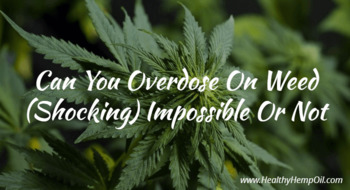The Signs of Weed Overdose

Weed is a strange drug in that it contains a lot of active ingredients. Although scientists cite different numbers, in addition to THC, there are thought to be over 100 other CBDs in weed. Not all of these act the same way. Get too much THC and you're likely to have a psychoactive reaction that is not unlike that of a stimulant like a methamphetamine. CBD is associated more with sedative effects.
The effects of weed use are all over the map. There have been cases of heart arrhythmias and sudden cardiac arrest while smoking weed. There are reports of both seizures and the reduction of seizures, which seems to be based on which type of CBD we're looking at.
Here are some examples of THC toxicity that have been published:
Psychosis or paranoia: Users report severe psychotic episodes with hallucinations and negative associations. In some cases, the psychosis can last significantly longer than the amount of time it should take to metabolize the THC.
Uncontrollable vomiting: Although THC often has anti-nausea properties, it can rarely be associated with a syndrome of persistent vomiting. More often associated with chronic weed use, uncontrollable vomiting is sometimes relieved with a hot shower.
Heart arrhythmias: Some doctors believe that heart disturbances are under-reported in weed use. Since smoking weed and taking other drugs often go together, it's really hard to isolate the cause when the heart starts doing crazy things. Even drinking alcohol intensifies the effects, which means you can't say for sure whether it was the pot or the booze that caused a problem.
Even the method of consumption makes a difference. THC that is consumed in edible form is metabolized differently than when it's inhaled. It takes longer to absorb THC in edibles, which can lead to the user thinking they didn't get enough.
Treating weed intoxication is typically a waiting game. Seeing as paranoia or psychosis may occur in the most extreme scenarios, it is important to soothe, reassure and put the affected individual in a comfortable environment. Once in the presence of trained medical professionals, those that ingested too much weed will quickly recover to their sober state.
